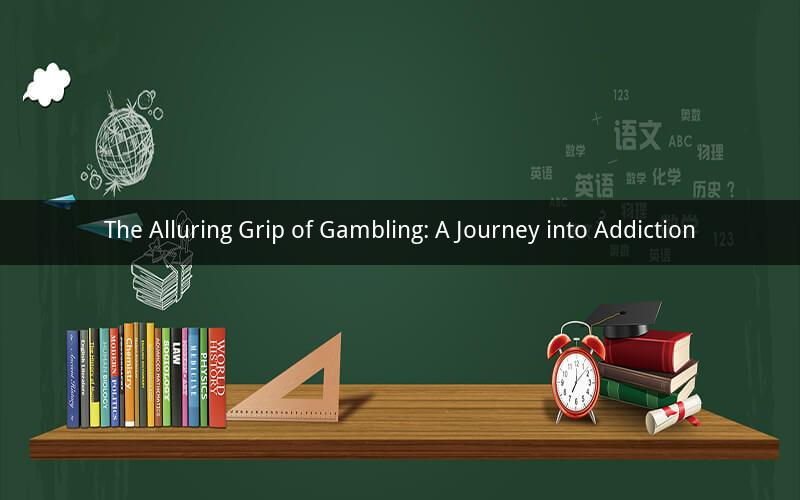
Gambling, often perceived as a form of entertainment, can easily turn into an all-consuming addiction. The allure of potential wealth and the thrill of taking risks can captivate individuals, leading them down a dangerous path. This article delves into the factors that contribute to gambling addiction, the signs to look out for, and the strategies to overcome this detrimental habit.
1. The Draw of Wealth and Thrills
Gambling is rooted in the promise of instant gratification and the allure of wealth. The thought of hitting the jackpot or winning big can be irresistible to many. The thrill of the unknown and the anticipation of victory are powerful motivators that can lead to an unhealthy obsession.
2. The Role of Social Influence
Peer pressure and social influence play a significant role in the development of gambling addiction. Those who engage in gambling activities with friends or in groups may find it harder to resist the temptation to keep playing. The social aspect of gambling can create a sense of camaraderie and reinforce the habit.
3. The Impact of Advertising and Marketing
The gambling industry spends billions on advertising and marketing campaigns, which can create an air of excitement and normalcy around gambling. These advertisements often depict glamorous lifestyles and emphasize the potential for quick wealth, further fueling the desire to gamble.
4. The Psychological Aspects of Addiction
Gambling addiction is a complex psychological disorder. Individuals who are prone to addiction may be more susceptible to the allure of gambling. Factors such as low self-esteem, anxiety, and the need for validation can contribute to the development of a gambling addiction.
5. Recognizing the Signs
Identifying the signs of a gambling addiction is crucial in taking the first steps towards overcoming it. Common signs include:
a) Increasing the amount of time spent on gambling activities
b) Lying to family and friends about gambling habits
c) Neglecting responsibilities and relationships
d) Experiencing financial difficulties
e) Feeling restless or irritable when unable to gamble
6. Overcoming Gambling Addiction
Overcoming a gambling addiction is a challenging process, but it is possible with the right support and strategies. Here are some effective ways to tackle this issue:
a) Seek Professional Help: A therapist or counselor can provide guidance and support throughout the recovery process. Therapy can help address underlying psychological issues that contribute to the addiction.
b) Support Groups: Joining a support group, such as Gamblers Anonymous, can provide a sense of community and understanding. Sharing experiences with others who have faced similar challenges can be incredibly helpful.
c) Create a Support System: Surround yourself with supportive individuals who understand your struggle and are committed to your recovery. This can include family members, friends, or professionals.
d) Develop Coping Mechanisms: Identify healthier ways to cope with stress, anxiety, and boredom. Engaging in activities such as exercise, meditation, or hobbies can help reduce the urge to gamble.
e) Establish Financial Boundaries: Set strict limits on your gambling budget and avoid using credit cards or loans to finance gambling activities. Seek help from financial advisors or debt counseling services if needed.
Questions and Answers:
1. Q: Can someone become addicted to gambling without any risk factors?
A: While it is possible for someone to develop a gambling addiction without any risk factors, the likelihood is higher for individuals who possess certain predispositions, such as a family history of addiction or mental health issues.
2. Q: How long does it take to overcome a gambling addiction?
A: The duration of recovery from a gambling addiction varies for each individual. Some may experience relief within a few months, while others may require ongoing support and therapy for several years.
3. Q: Can someone who has overcome a gambling addiction gamble responsibly in the future?
A: While it is possible for someone to gamble responsibly in the future, it is crucial for them to remain vigilant about their triggers and maintain their recovery strategies. The risk of relapse is always present, and continued self-awareness is essential.
4. Q: Is there a cure for gambling addiction?
A: There is no definitive cure for gambling addiction, as it is considered a chronic condition. However, with effective treatment and ongoing support, individuals can manage their addiction and lead fulfilling lives.
5. Q: Can family members of someone with a gambling addiction help in their recovery?
A: Yes, family members can play a vital role in the recovery process. By providing unconditional support, understanding, and encouragement, they can help create a supportive environment that aids in the individual's journey towards recovery.